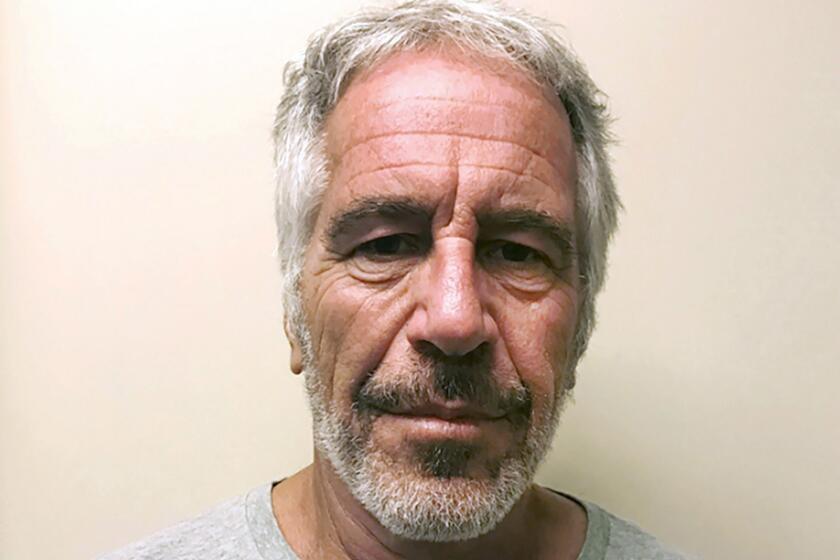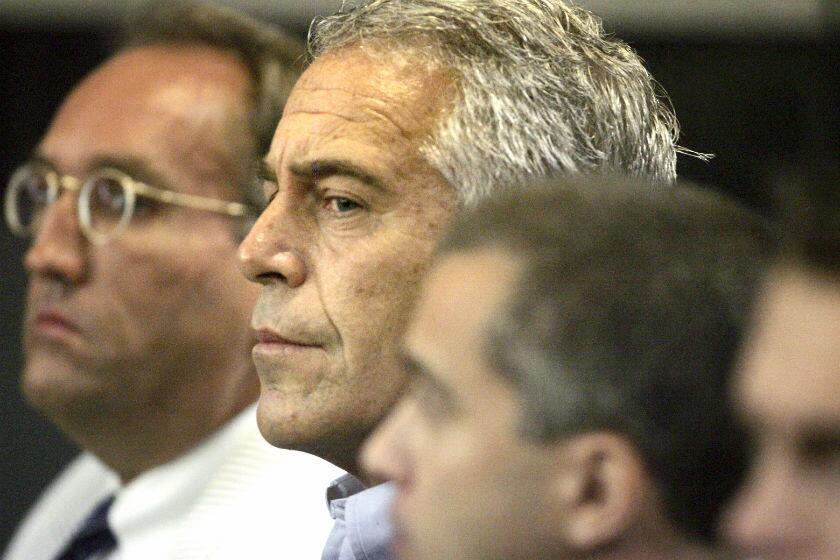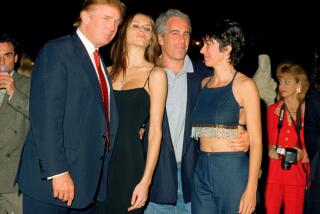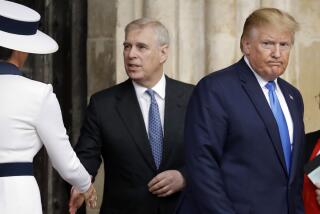Ghislaine Maxwell sentenced to 20 years in Jeffrey Epstein sex abuse case
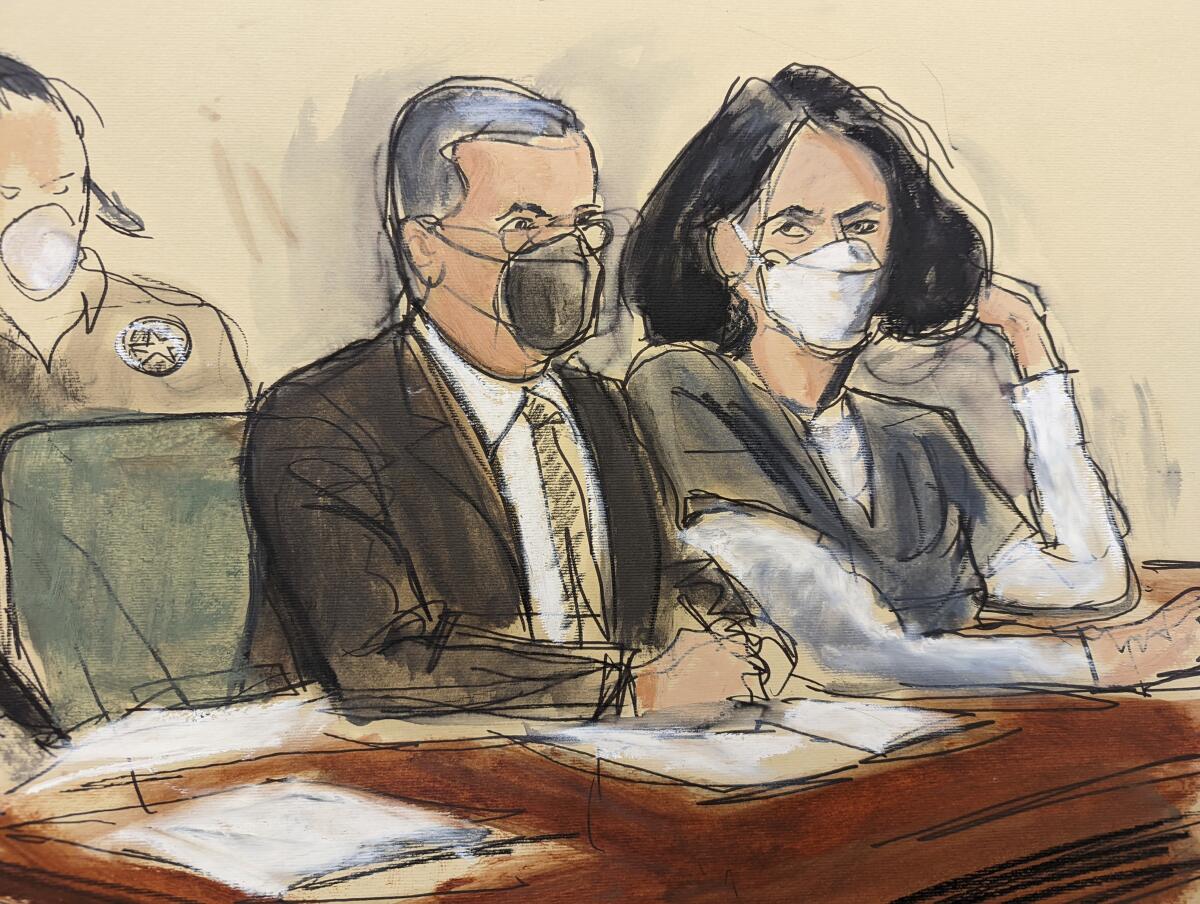
NEW YORK — Ghislaine Maxwell, the jet-setting socialite who once consorted with royals, presidents and billionaires, was sentenced Tuesday to 20 years in prison for helping the financier Jeffrey Epstein sexually abuse underage girls.
The stiff sentence was a victory for a group of women who spent years fighting for justice after an earlier generation of prosecutors failed to pursue the predatory power couple.
Epstein, who killed himself in 2019 while awaiting trial, sexually abused children hundreds of times over more than a decade, exploiting vulnerable girls as young as 14. Prosecutors said he couldn’t have done so without the help of Maxwell, his onetime girlfriend and longtime companion.
Maxwell, wearing a blue prison uniform and a white mask to conform with coronavirus rules, looked to one side as the sentence was announced, but otherwise did not react. She wore leg shackles that could be heard rattling when she walked into the courtroom.
The sentence was shorter than the term sought by prosecutors, but Epstein’s accusers still expressed relief.
“It’s been an incredibly long road to justice for myself and for many other survivors,” said Sarah Ransome, one of Epstein’s accusers. “This is for the girls that didn’t have their say, the ones that weren’t here.”
A jury in December convicted Maxwell, 60, of sex trafficking, transporting a minor to participate in illegal sex acts and two conspiracy charges.
Judge Alison J. Nathan noted as she imposed the prison term and a $750,000 fine that Maxwell never expressed remorse for her crimes. The judge said she wanted the sentence to send an “unmistakable message” that nobody was above the law.
A fund to provide money to victims of financier Jeffrey Epstein is winding down after announcing payments of nearly $125 million to over 135 people.
Addressing the court earlier, Maxwell stood at a lectern and said she empathized with the survivors and hoped her punishment would bring them peace. But she did not admit culpability and laid blame for the abuse on Epstein, saying meeting him was the “greatest regret of my life.”
She called him “a manipulative, cunning and controlling man who lived a profoundly compartmentalized life.”
The judge said Maxwell was being punished for her “heinous and predatory” crimes, not Epstein’s. She criticized Maxwell’s “pattern of deflection and blame.”
Four survivors at the sentencing described their sexual abuse, including Annie Farmer, who was briefly overcome with emotion as she addressed the judge.
She said she and her sister tried to go public with their stories about being abused by Epstein and Maxwell two decades ago, only to be shut down by the couple through threats and influence with authorities.
“We will continue to live with the harm she caused us,” Farmer said.
Inside a courtroom crowded with reporters, three of Maxwell’s siblings sat in a row behind her. Outside the courthouse, Kevin Maxwell said that his sister won’t give up on her legal battle, “and we as a family will be solidly behind her.”
Defense attorney Bobbi Sternheim promised to appeal. She said Epstein left Maxwell “holding the whole bag.”
“We all know that the person who should have been sentenced today escaped accountability, avoided his victims, avoided absorbing their pain and receiving the punishment he truly deserved,” she said.
Over the last 17 years, scores of women have accused Epstein of abusing them. Many described Maxwell as acting as a madam who recruited them.
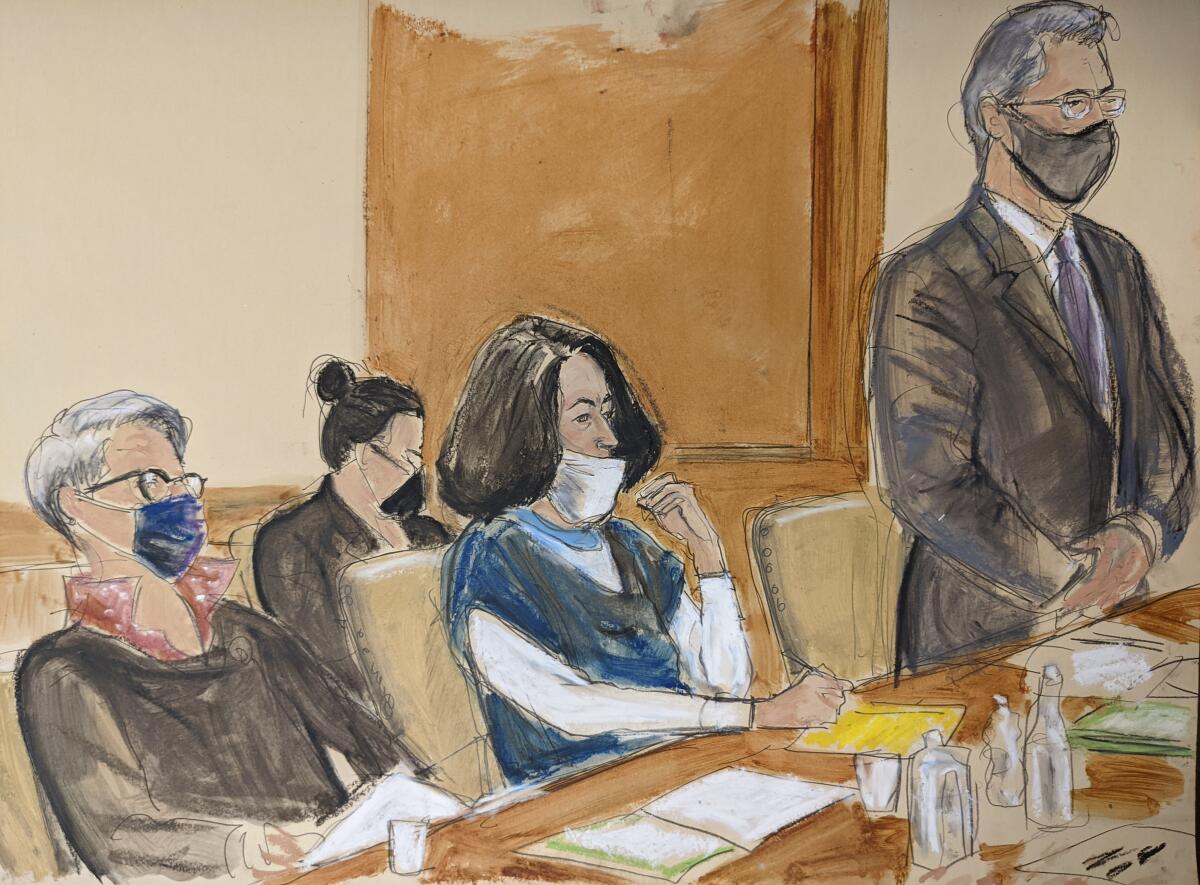
The allegations against Epstein first surfaced publicly in 2005. The FBI and local police had at the time amassed evidence of sexual misconduct with many underage girls.
But under a deal with federal and state prosecutors in Florida, later criticized as lenient, Epstein pleaded guilty to prostitution-related charges involving just one girl and served 13 months in prison, much of it in a work-release program. Afterward, he was required to register as a sex offender.
In the years that followed, many women sued Epstein over alleged abuse. One, Virginia Giuffre, claimed that Epstein and Maxwell had also pressured her into sexual trysts with other powerful men, including Britain’s Prince Andrew. All of those men denied the allegations, and Giuffre ultimately settled a lawsuit against Andrew out of court.
Federal prosecutors in New York revived the case against Epstein after stories by the Miami Herald in 2018 brought new attention to his crimes. He was arrested in 2019, and killed himself in prison a month later.
Eleven months after his death, Maxwell was arrested at a New Hampshire estate. Since then, she has been jailed in a federal facility in New York City.
Epstein and Maxwell’s associations with some of the world’s most famous people were not a prominent part of her trial, but mentions of friends such as Bill Clinton and Donald Trump showed how the pair exploited their connections to impress their prey.
The trial revolved around allegations from only a few of Epstein’s accusers.
Two Caribbean islands owned by the infamous financier Jeffrey Epstein, including Little St. James Island, have surfaced for sale for $125 million.
Four testified that they were abused as teens in the 1990s and early 2000s at Epstein’s mansions in Florida, New York, New Mexico and the Virgin Islands.
Three were identified in court only by their first names or pseudonyms to protect their privacy: Jane, a television actor; Kate, an ex-model from Britain; and Carolyn, now a mom recovering from drug addiction. The fourth was Farmer, who identified herself in court by her real name after speaking out publicly.
They described how Maxwell charmed them with conversation, gifts and promises that Epstein could use his wealth and connections to help fulfill their dreams.
Jeffrey Epstein’s former New York home — a 28,000-square-foot French Neoclassical mansion that the FBI raided in 2019 — just sold for $51 million.
Then, they testified, she led them to give Epstein massages that turned sexual, and played it off as normal.
Carolyn testified that she was one of several underprivileged teens who lived near Epstein’s Florida home in the early 2000s and took up an offer to massage him in exchange for $100 bills in what prosecutors described as “a pyramid of abuse.”
Maxwell made all the arrangements, Carolyn told the jury, even though Maxwell knew she was only 14 at the time.
Breaking News
Get breaking news, investigations, analysis and more signature journalism from the Los Angeles Times in your inbox.
You may occasionally receive promotional content from the Los Angeles Times.
Maxwell’s lawyers also fought to have her conviction tossed out on the grounds of juror misconduct.
Days after the verdict, one juror gave media interviews in which he disclosed that he had been sexually abused as a child — something he hadn’t told the court during jury selection. Maxwell’s lawyers said she deserved a new trial. A judge disagreed.
Paul Haggis will stand trial in October for assault allegations dating to 2013. The ‘Crash’ director was recently arrested in Italy on separate allegations.
During Maxwell’s sentencing hearing Tuesday, the juror sat quietly among other spectators.
At least eight women have submitted letters to the judge describing the sexual abuse they said they endured from having met Maxwell and Epstein.
Maxwell’s eldest siblings, Anne Holve and Philip Maxwell, wrote to the court to ask for leniency and said that their sister’s relationship with Epstein began soon after the 1991 death of their father, the British newspaper magnate Robert Maxwell.
Robert Maxwell, they wrote, subjected his daughter to “frequent rapid mood swings, huge rages and rejections,” which “led her to becoming very vulnerable to abusive and powerful men who would be able to take advantage of her innate good nature.”
Ransome — an accuser whose allegations weren’t included in the trial — testified about the lasting harm to her life, gazing directly at Maxwell several times.
“You broke me in unfathomable ways,” said Ransome, who said she twice tried to kill herself. “But you did not break my spirit.”
More to Read
Sign up for Essential California
The most important California stories and recommendations in your inbox every morning.
You may occasionally receive promotional content from the Los Angeles Times.
